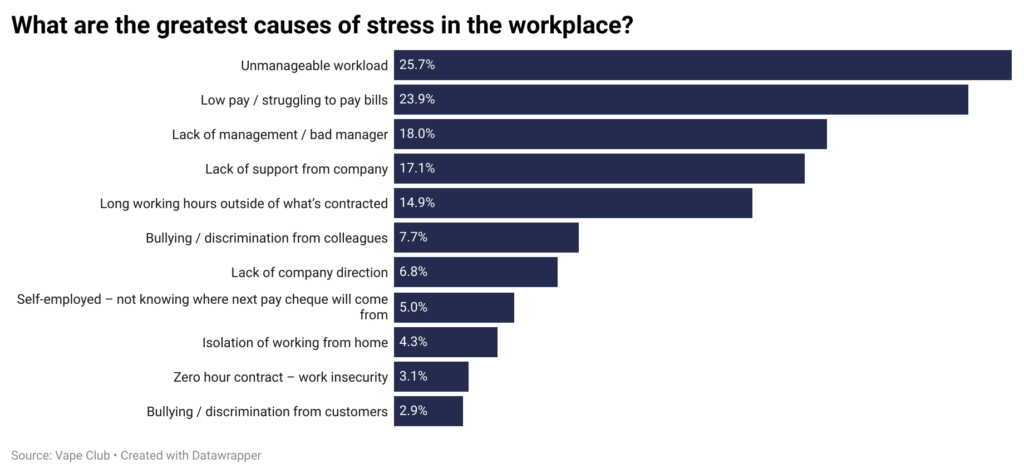On National Stress Awareness Day today, on 3 November 2021, experts are urging employers to turn their attention to soaring rates of excessive stress and burnout rates in UK workplaces.
A new study has issued a stark warning for HR and business leaders after finding that demand for burnout support has soared by 221%. The findings come alongside reports that nearly half of UK employees have suffered from excessive stress over the last year; and resulted in 10% leaving their jobs. Experts have confirmed that we’re seeing a ‘burnout build-up’ for employees; which is likely to grow as we move into the winter months.
There’s been a 221% spike in searches for ‘signs of burnout’ over the last three months, according to Google search data analysis; carried out on behalf of Vape Club. This is the culmination of a year of heightened risk of burnout among employees; with the latest data showing a 31% overall increase in searches for ‘signs of burnout’ over the last 12 months, compared to the previous year.
Additionally, a staggering 92% of UK doctors have also reported a surge in people seeking medical advice for work-related stress and anxiety, as reported. Experts are now urging HR and leadership teams to turn their attention to this issue, particularly as winter approaches; as it’s a time of year when mental health concerns often surge. UK medics are also predicting that the worst is yet to come unless something is done about it.

EXCESSIVE STRESS PREDICTOR OF BURNOUT
Excessive stress is considered to be a major predictor of burnout and other mental health impacts. A recent mental health and employee stress study of staff from over 500 companies in the UK, found that almost half of employees (47%) experienced excessive stress at work in the past year. This is becoming a big challenge for employers trying to retain their employees. In fact, one in eight have considered leaving their current job due to excessive work-related stress. Furthermore, one in 10 have actually quit in the last 12 months for this very reason.
The research also uncovered some of the biggest impacts of excessive stress. They include an inability to sleep (reported by 41%); physical health impacts (30%); and withdrawal from social interactions and relationships (26%). The biggest causes of stress in the workplace include unmanageable workloads (25.7%), followed by low pay (23.9%), bad management (18%) or lack of company support (17%); as shown in the chart below.

HEAVY WORKLOADS PILING ON THE STRESS
“Burnout is a state of emotional, physical and mental exhaustion caused by excessive and prolonged stress,” stated Richard Holmes, Director of Wellbeing at Westfield Health. “Pressure at work is usually the main culprit. When budgets are tight and teams are small, people often find themselves with multiple roles and heavy workloads, piling on the stress.”
He believes that policies like “turning off email servers outside of working hours helps ring-fence valuable recovery time”. “Mental health first aid training can also help managers spot the signs or triggers and put preventions in place,” he added.
That said, when employees were asked about the support received from their workplace, one in every eight employees felt they didn’t receive the required support.

TACKLING EXCESSIVE STRESS
So what can else can HR/leaders do to tackle excessive stress? Claire Brown, a qualified life and career coach, believes that companies can better support staff by encouraging them to have an input into the organisation of tasks, duty and priorities; and be invited to engage at every possible level in devising an in-house stress management policy. “Employees should be encouraged to prioritise their health and wellbeing above productivity by taking regular breaks from the screen and getting fresh air where possible,” advised Brown.
Providing alternative and innovative ways for connection and communication between team members “is also really valuable”, she added. “By adopting a flexible attitude and approach to how and when work is completed, this alleviates some of the pressure and mental strain. As always, communication is key. It’s important for employers to be fair and realistic about what is possible; and to seek opportunities to provide practical support to help team members manage their workload.”
Another US study also found that employee mental health continues to deteriorate; and cites work overload as the main factor. Click here to read more.







































